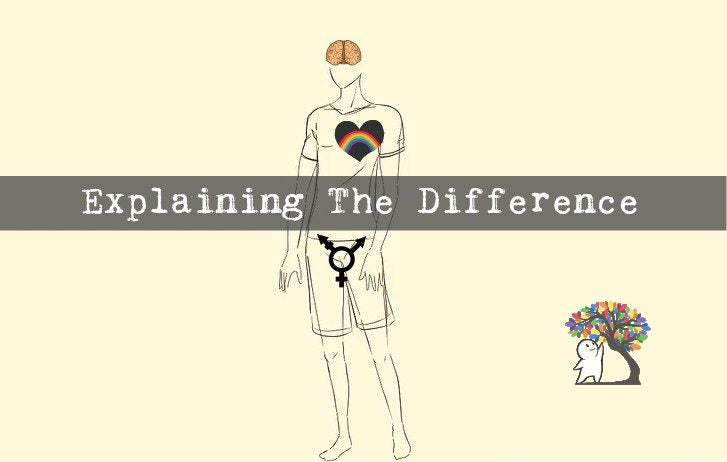
Sex vs. Gender vs. Orientation
Share
The Good News About Sex-Ed
Very recently, the United Nations launched an updated guidance initiative to teach current and relevant information on sexual education in partnership with multiple countries. This will have been the first update to relevant criteria made by the UN in 10 years. These updates offer new students a positive approach to sex and sexuality, as well as new information on gender identity and expression.
Yes, this is good news. In a number of areas on the planet, today’s youth will have a new and shame/prejudice-free understanding of these often-taboo topics. That’s great! But what about the rest of us who have completed our formal education or are already being taught in current sex-ed programming?
The Bad News
In the United States, 80% of schools are failing the Centers for Disease Control and Prevention’s (CDC) standards for sexual education. A number of topics are being taught to students, including but not limited to the use of condoms for STI protection. But safe sex is for another article. I’m talking about information on sexuality, a subject area marked important by the CDC, which is also getting a lack of attention.
In turn, this lack of education has resulted in the belittling and mistreatment of trans and gender-nonconforming individuals all over the world. Even places like Canada, which prides itself on its liberal and humanitarian nature, are homes to those who speak out against trans-friendly curriculums, calling them “biologically absurd” and against “traditional family values". Barry Neufeld, an educator and native to Chilliwack BC, stated “… Allowing little children choose to change gender is nothing short of child abuse”.
This sounds a little extreme. It sounds downright transphobic. But I believe Mr. Neufeld has no real concept of what gender actually is. I believe if he did, he’d see why learning about trans people – queer people in general – is a good thing.
Let's take a look at sex, gender, and orientation. Here’s a brief look (or reminder, for many of you) of their differences, what we can change, and what we can’t.
Sex
Is what lies between our legs. It is the physiology we are born with. Our sex consists of our biological makeup, which can include things like our genitals, our secondary sex characteristics – our placement of body hair, hip width, our hairlines – and our chromosomal makeup.
As you might know, your chromosomal makeup (XX or XY) can determine sex characteristics that are typical of males or females. The problem with relying solely on science to determine someone’s gender? Biology can be tricky. Having two X chromosomes may make you female, but they don’t automatically make someone a woman (I’ll explain in the next point). In addition, having male or female-typical chromosomes doesn’t always lead to the secondary sex characteristics typical to that sex. People with XY chromosomal combinations – which would typically give way to male sex characteristics – may actually exhibit female characteristics instead. This contrast between makeup and characteristics is what many call intersex. Intersex individuals often do not fit typical definitions of male or female bodies.
Gender
Is a construct. I know we’ve all heard this before. We hear people say it all the time, but what does it actually mean? Well, it means gender is constructed. Made up. It is what we make it – what we think it to be.
Our genders consist of our gender identities - what we think about ourselves, and how we interpret gender - and our gender expression. Gender expression is how we demonstrate our gender in our behaviors, mannerisms, and forms of dress.
Gender also consists of the societal expectations and stereotypes we place on people. We often base these expectations off of their sex characteristics. Yes, we’ve all heard the typical stereotypes. Pink for girls, blue for boys. Action figures versus Barbie dolls. Long hair versus buzz cuts. Women must be feminine, while men must be masculine.
This is not to discredit or disrespect any girly girls or manly men out there. Many of us feel comfortable in our expected genders, and that’s perfectly okay! But of course, there are a number of people who don’t want to adhere to every norm.
Different people view gender differently and thus express their gender differently. There are some people who don’t like or identify the gender role the world has given them, and so they identify as another. These are the trans people of the world: these include people with XY chromosomes for example, (see me building up my point here?) – even typical male sex characteristics – who identify gender-wise, as women. There are also people who prefer to have both or neither of the traditional man/woman gender titles: these are nonbinary - or genderqueer - people.
Orientation
Is about who we like. Orientation is about the sex-gender combination – or lack thereof – that turns us on the most. While are all very capable of selecting potential partners, the pool of people we get to choose from is subject to our autonomic arousal responses (and our intrusive romantic daydreaming).
Most people go crazy over people of the opposite gender. Some people go crazy over those of the same gender. Some people couldn’t care less about gender: to some, it’s all about the appeal of masculine or feminine energy. Some people are capable of falling for someone regardless of their sex or gender presentation. A lot of people seem to think this one’s a choice… But we all just feel what we feel! Our urges are innate and made subconsciously. The only choice anyone has about who they fall for is the choice to pursue them or not.
Please remember, I am not a sexual psychology professional! These definitions are brief, and sexuality is vast and complicated. I am fully aware some of this is obvious to many of you. But considering the statistics we have on sex-education today, a lot of us may benefit from this information.
Is there a topic or point in this article that you would like to see expanded upon? Do you have any opinions of your own about sex, gender, and orientation? Let us know in the comments below!
Sources:
